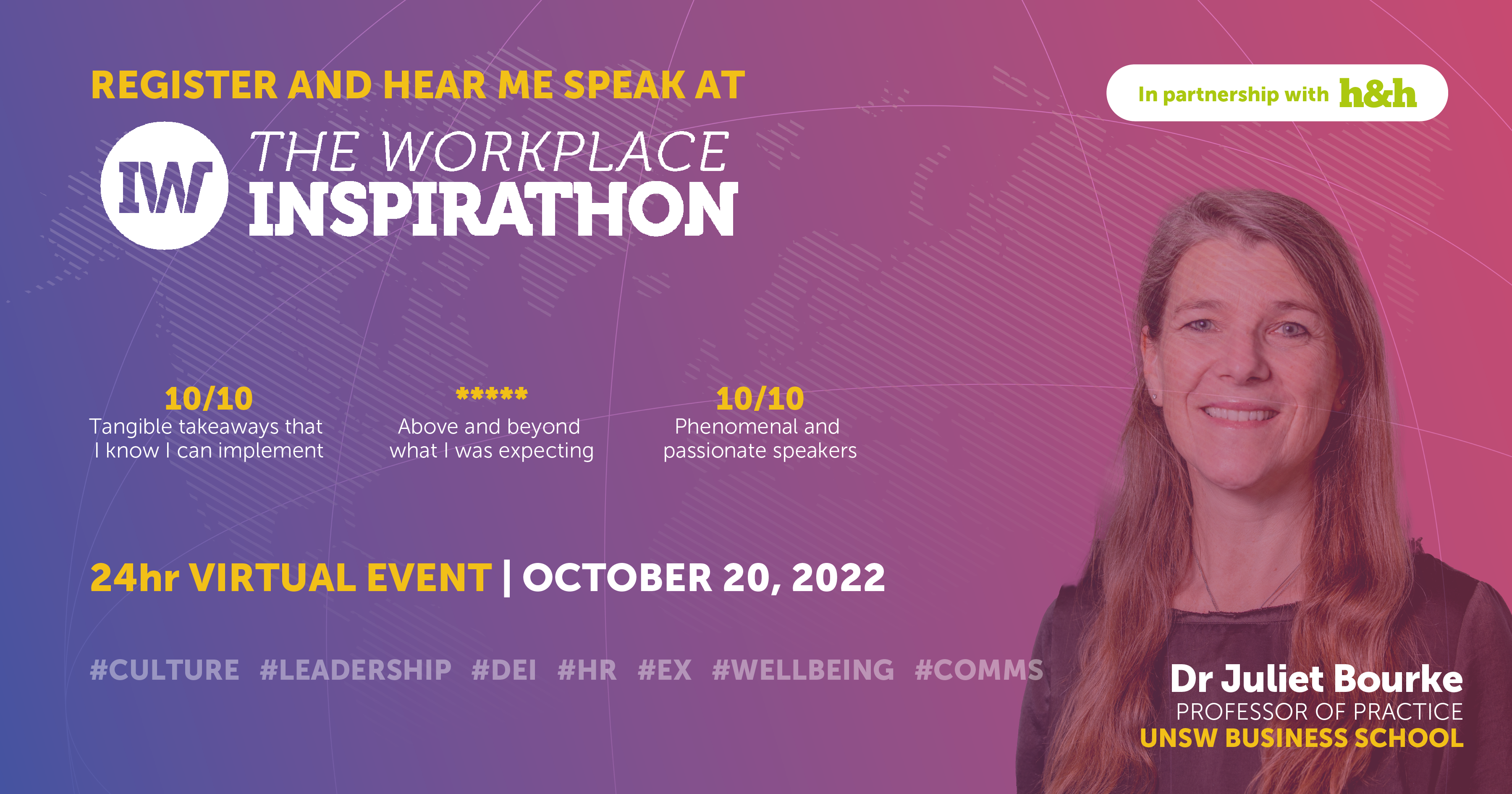
03rd October 2022
Meet Inspirathon speaker – Dr. Juliet Bourke

Meet the Inspirathon 2022 speaker, Dr. Juliet Bourke. Sign up free for the Inspirathon
Dr Juliet Bourke is a Professor of Practice in the School of Management and Governance at the Business School of the University of New South Wales. Formerly a Human Capital at Deloitte leading the Diversity and Inclusion practice, Juliet now works with global organisations to transform their workplace cultures so they are more inclusive of diversity. In particular she assesses and develops leaders’ inclusive leadership capabilities, and guides the development of organisational DEI strategies. Her research on inclusive leadership, diversity of thinking and interpersonal inclusion is well known, with regular articles in the Harvard Business Review and a talk on TEDx. Her most recent book (2021) is entitled Which two heads are better than one? The extraordinary power of diversity of thinking and inclusive leadership. Juliet sits on a number of boards including the Global Institute for Women’s Leadership and qChange (a US-based HR tech start-up). The depth of Juliet’s capabilities, and her contributions to organisational effectiveness and public policy reform have been recognised through her receipt of awards such as Engagedly’s Top 100 Global HR Influencer in 2021 and 2022, the Australian Financial Review’s Top 100 Women of Influence and the Deloitte Chairman’s Global Recognition Award in 2019. In 2022 she completed her PhD and was awarded the Dean’s prize for innovation and impact.
Why do you do what you do?
I am passionate about social justice and helping organisations, as well as the broader community, create environments which are more inclusive of diversity. I have been given so many opportunities in life and feel a keen sense of responsibility to create pathways to ensure others have those same opportunities. I am also very passionate about research and evidence-based decision making, and in particular adding to the DEI/HR practitioner toolbox evidence-based ideas that make a difference in practice.
Describe your talk in 100 words
I’ve watched the transformation of DEI as an HR problem to be managed, to a topic discussed around Executive and Board tables in terms of social responsibility and organisational effectiveness. As a consequence, many organisations now have great DEI policies and programs, and are introducing initiatives to build inclusive leaders, but one area that has been overlooked is the powerful ability of workplace colleagues to co-create inclusive teams. My talk will shine a light on the three small behaviours of interpersonal inclusion and the link between those behaviours and individual job performance as well as team effectiveness.
What problems will your talk solve for our audience and why is it needed?
Team members who identify themselves as more different to the rest of the team are three times less likely to experience behaviours of interpersonal inclusion than people who identify as more similar to the team. That makes a significant difference to their ability to do their jobs, and it makes a difference to the colleague who is neglecting them as interpersonal inclusion stimulates reciprocal behaviours and thus benefits both parties. Even though we all have many more relationships with colleagues than leaders, relationships between colleagues have been overlooked as an area worthy of attention in terms of developing a more inclusive workplace. Hence team members may not recognise the important role they play, complementing that played by inclusive leadership and organisational policies. Focussing on interpersonal inclusion is thus the last piece of the DEI puzzle.
What valuable insights, strategies, tools or techniques will our audience walk away with?
The audience will be clear about the three types of interpersonal inclusion behaviours (namely instrumental assistance, emotional bond and embodied connection), why they are important and how to use those behaviours in both a face to face and virtual setting. These insights are relevant to everyone who is a team member, as well as DEI/HR/business leaders who wish to develop a more comprehensive approach to creating an inclusive workplace beyond introducing policies and programs and building leaders’ capabilities.
What do you think will be the major differentiator of the workplace of the future, as opposed to the way we work today?
The workplace of the future is going to place much greater weight on social skills such as interpersonal inclusion, and not just focus on technical skills. The reason for this shift is the increasing ability for machines and digital technology to do technical work, leaving humans to do what humans do best, namely interact with other humans. As the need for team work grows, good social skills will differentiate the humans who are better working as individual contributors and those who can influence, persuade and work with people. A critical social skill is interpersonal inclusion between team members.

